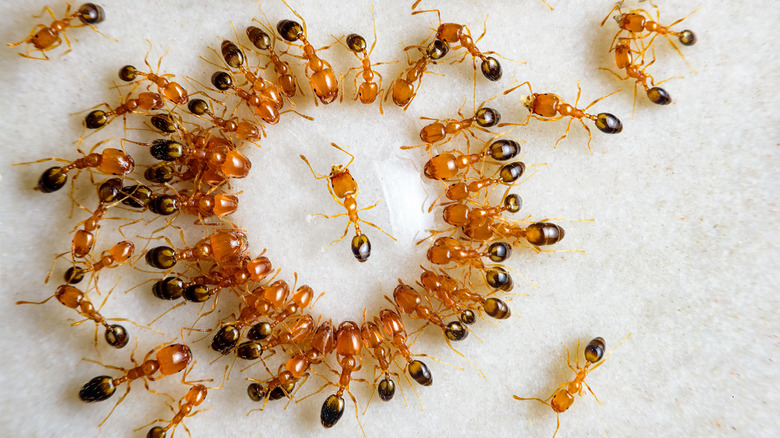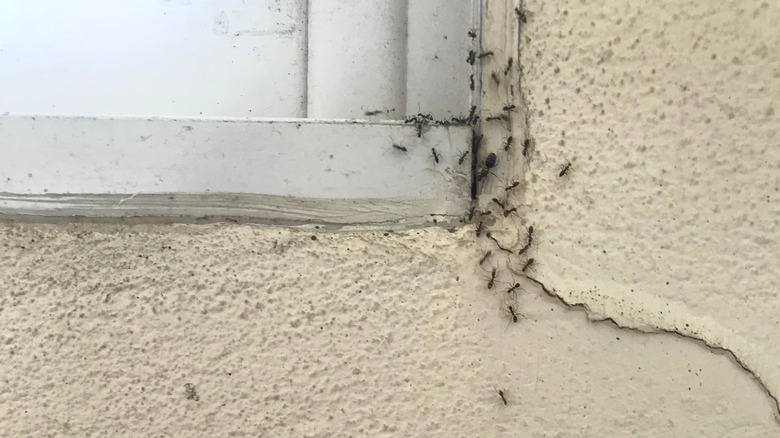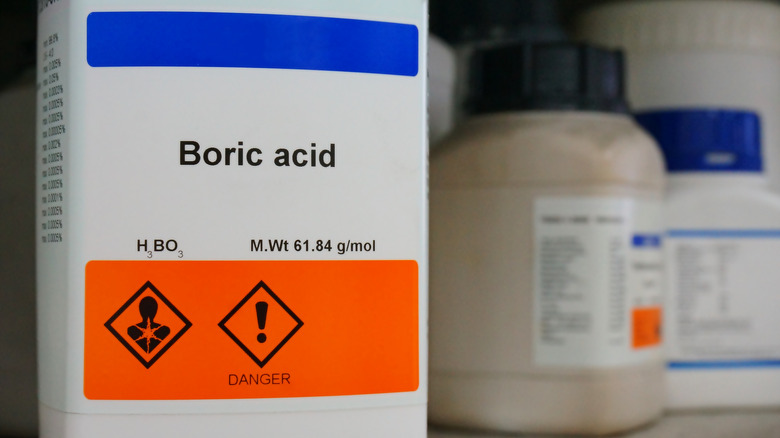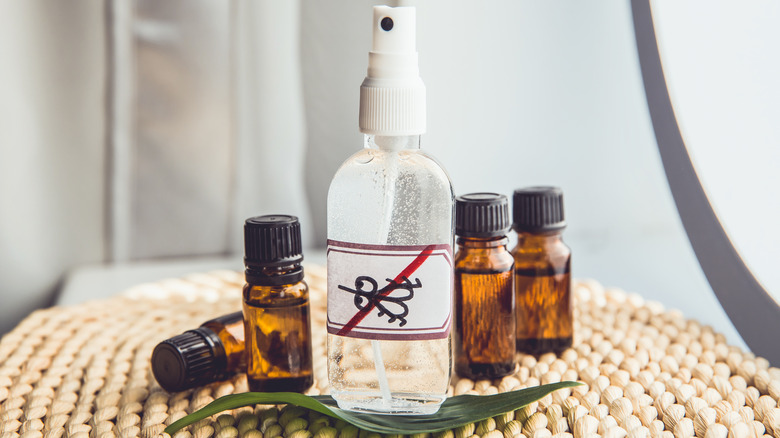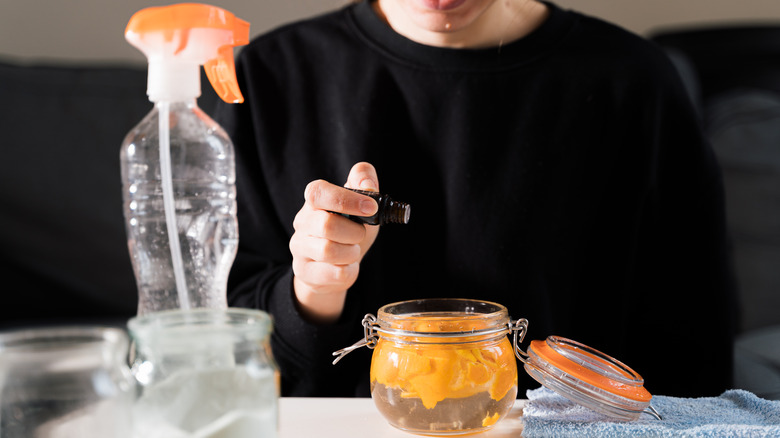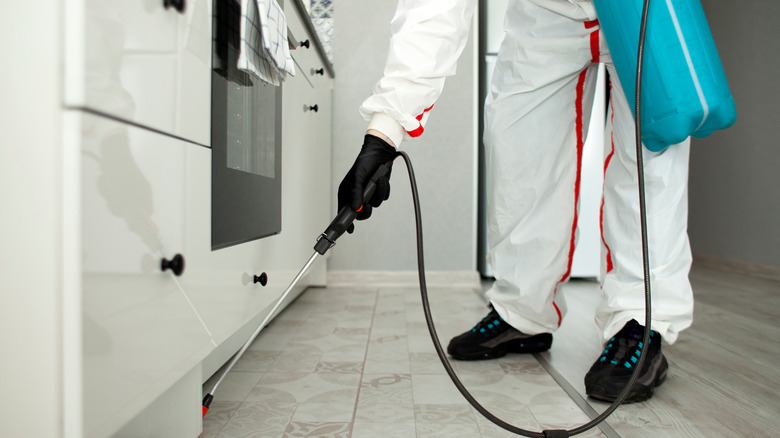How To Really Get Rid Of Ants In Your Kitchen
You don't love your kitchen as much as some insects do. In fact, while you're away and busy with other things, ants will get attracted to your food –- cooked or raw –- if not properly stored. FYI, not all ants are kitchen freaks; according to Terminix, out of the over 12,000 species of ants discovered so far, only eight of them are kitchen invaders. These include dark rover ants, odorous house ants, fire ants, acrobat ants, field ants, thief ants, and carpenter ants.
So, how do ants smell food in your house? Well, they are masters of cooperation. As Rentokil narrates, the worker ants are sent in squads to hunt for food, and when they find traces — for example, crumbs of Oreo cookies dropped on the doorstep — they track the source (probably leftovers in the kitchen oven), invite other ants in using a natural chemical called pheromone, and build nests in your kitchen.
Now, how can you get rid of ants in your kitchen? While these little creatures are all-year-round invaders, their activities spike in the spring and summer when the temperature increases (via Northwest), so this may be the best time to get rid of ants permanently. As Bob Vila explains, one must find and seal the entries, locate and destroy nests, kill the colonies, and prevent future invasion. With the eight techniques shared below, you can get rid of ants safely.
Deny ants access to food
The key to all motivation is desire, and if there's anything a nuisance ant wants in your kitchen, it's food and water and constant access to both. Cut the supply, and you leave a colony with two choices: to leave for a greener pasture outside or die of starvation.
The first step to cutting food supply is to make sure you're doing the dishes promptly and cleaning your dishwasher right. As MMPC explains, you also have to look carefully around corners where food bits may be sitting, such as under the oven, behind the refrigerator, around the stove, and every tight corner. Addison Pest Control Of Texas also suggests that food items should be sealed properly, unwanted leftovers should be disposed of, pet food should be picked up before bed, and you should clean your oven properly and regularly.
Similarly, to restrict ants' access to water, drains should be sealed with a silicone cover, sinks and other frequently wet areas should be wiped dry at all times, faucets should be tightly locked when not in use, and sugary or sweet liquid should be tightly sealed or mopped when spilled.
Eliminate ant entrances
After denying the ones indoors food and water, the next step is eliminating ant entrances to stop further invasions. This is especially important in summer when most of the little creatures come in not specifically for food but to get cover from the heat outside. Mind you, just one opening is enough for hundreds of thief ants to break in, but if you're committed and use attention to detail, you'll not miss a single spot.
As suggested by Healthline, infested house plants should, at first, be discarded altogether, and those on the window sills should have their soil surrounded with sliced lemons to ward off incoming insects. Also, climber plants on external walls should be treated or disconnected to stop giving the insects a way in.
Arrow Termite & Pest Control warns that wall cracks should be found and sealed off with caulking and sealants. When looking for cracks, they mostly appear around the doors, windows, and foundation of the building. Most sealants are made of degradable material that wears out over time, so you better keep an eye out and be ready to reseal as needed.
Disrupt nests and detract ants
Next up, we want to drive all ants out of their hiding spot for an easy kill and 100% elimination. To do this, you need to understand how to find ant nests in the kitchen. According to Terro, signs you should look for are the mound of dirt or sand excavated by fire ants, wood shavings used by carpenter ants, and traces of dead insects.
These signs should lead you to locate anthills, holes, corners, hidden cracks, and spaces underneath static home appliances where a colony of the insect may hang out. Once spotted, ExtermPRO explains, potential hangout spots should be disrupted with super hot water, which can also kill the ants. But as always, remember to put on your PPE (personal protective equipment), especially when dealing with an aggressive species like fire ants that can be territorial when attacked.
As for areas where water can be destructive –- the corners around electrical appliances –- Healthline writes that lemon detracts ants, so if you have some lemon rinds, simply throw them in those places.
Use boric acid on ants
According to The Manual, boric acid (which is purchasable in most grocery stores) is a powerful remedy capable of getting rid of all species of ants in the kitchen and other rooms in just three weeks. Before diving into the application process, beware that boric acid is a type of poison that can be harmful to you, kids, and pets if ingested.
In fact, as explained by Cuteness, insects killed with boric acid will cause borate poisoning in a dog that eats them. To this end, be sure to put on your protective gear before application, endeavor to wipe all surfaces of contact after the kill, and instantly dispose of dead insects properly.
So, on to the application process: First, prepare the solution by dissolving 8 teaspoons of sugar and 1/2 teaspoon of boric powder in 1 cup of warm water. Next, spray the mixture on exposed insects and into hideouts. Healthline also suggests soaking cotton balls in the solution and strategically placing them around your home. Patience is vital, as ants treated with boric acid won't die quickly, and it can take three to four weeks to start seeing results.
Kill ants with borax
Borax does really get rid of ants for good. As narrated by Rachel of Mashup Mom, who was able to eliminate a colony of the tiny insects living around a kitchen cabinet in a few days, borax paired with sugar bait is a long-term remedy with lasting effects (in the case of returning invaders). It works on centipedes that invade your house too. And just like boric acid, borax is toxic –- it causes diarrhea or nausea if ingested in little amounts and gives rise to kidney failure or shock when ingested in large volumes (via WebMD). Be sure to put on your safety gear and avoid skin contact with borax to prevent rashes or skin irritation.
As explained by HomeQuicks, there are about five different ways to kill household ants with borax, and they are all proven effective. The first option is to fill the insect hideouts with a thoroughly mixed combo of 1 cup of sugar and 2 tablespoons of borax. The second option is to drop cotton balls dipped in a mixture of 1 cup of water, 1 cup of sugar, and 2 tablespoons of borax where the insects live. You can also leave a mix of borax and peanut butter around nesting sites.
Make an ant-killing spray
According to Creative Green Living, essential oil contains insect-invasive agents that make the oil a natural but effective way to get rid of a massive invasion in a few hours. The effects are said to last for one to four weeks, depending on the traffic the area receives and how often it is mopped. However, most essential oils are merely repellants. As Revive lists, the five ant-killer essential oils are patchouli essential oil, cedarwood essential oil, lemongrass essential oil, peppermint essential oil, and cinnamon essential oil.
Optionally, you can make a DIY ant-repellant essential oil mix, as illustrated by Good Housekeeping. Simply combine 30 drops of peppermint essential oil, 50 drops of citrus essential oil, 4 ounces of water, 2 teaspoons of liquid soap, 4 ounces of witch hazel, and 20 drops of clove essential oil, all in a 9-ounce spray bottle. Spray directly on the invading ants.
Pro tip: An attacked group of ants can easily warn others to escape using the natural chemical pheromone. To break this network of communication, sprinkle soapy water around the area of application before spraying with your homemade essential oil ant-killer.
Repel ants with vinegar
It is noteworthy that vinegar does not kill the uninvited kitchen guest. As Payne Pest Management explains, most homeowners go for vinegar because it's safe around both kids and pets, ants resent the smell and run away from it, and it is most readily available. Now, while the regular white vinegar is enough to make a small-size colony cringe out of your home, it takes a turbocharged solution of apple cider vinegar to send a large population packing. So, how do you go about it?
Do what Hunker says by mixing 2 parts vinegar with 1 part water in a clean spray bottle. Supercharge the solution with a few drops of essential oil as advised by Go-Forth Pest Control and shake the spray bottle well to activate the content. Finally, spray the mixture directly at the crawly insects and work your way around all nests. If you're allergic to vinegar, opt for the non-invasive alternatives listed by NDTV, such as salt, chalk, cinnamon, or peppermint. Also, remember to reapply the solution every day until all ants have vacated.
Get professional help
Some special cases call for the expertise of professional ant exterminators (via Isotech Pest Management). Take, for instance, a situation where every time you do it yourself, the ants always find their way back. In this case, professional exterminators will locate the anthills on your property, unveil hidden nests, and locate secrete tunnels. Likewise, if you're invaded by an aggressive swarm that stings you out of the kitchen, it may not be safe to handle the remediation yourself. Also, a colony that has made a nest in the foundation of your home should be handled by professionals, so you don't wind up with structural damage.
Besides, you can't possibly do it better than the technician. As Pratt Pest explains, professional exterminators will carry out a knee-deep investigation of your property, recognize the species of insect to develop a proper extermination plan, professionally seal cracks and passages, and implement state-of-the-art equipment. Mind you, as you go about searching, do proper background research on each company to avoid falling into the trap of the fly-by-night so-called professionals. A good place to start is with your friends — ask them for recommendations.
